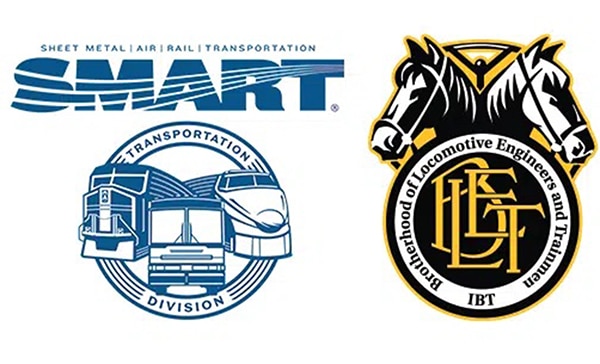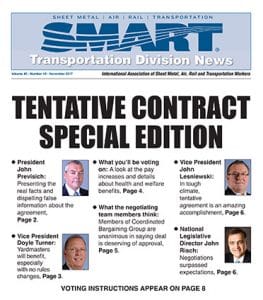By a margin of nearly four to one, SMART Transportation Division members have voted to APPROVE the new National Rail Contract. The voting was conducted by BallotPoint Election Services, who certified the following results for each craft eligible to vote:
| CRAFT | ACCEPT | REJECT |
| Conductors | 79.89% | 20.11% |
| Brakemen | 78.98% | 21.02% |
| Engine Service | 76.58% | 23.42% |
| Yardmen | 79.97% | 20.03% |
| Yardmaster | 86.68% | 13.32% |
| Combined | 79.57% | 20.43% |
The approved contract will have an effective date of December 1, 2017, with implementation of new pay rates and employee healthcare cost-sharing modifications planned for January 1, 2018. Employees’ monthly healthcare contributions will remain frozen at $228.89 for the life of the contract.
The term of the agreement is for five years, from January 1, 2015 to December 31, 2019. In addition to a 3% increase previously negotiated and already implemented on January 1, 2015, the contract provides for full retroactive pay of 2% from July 1, 2016 through June 30, 2017, and 4% from July 1, 2017, until implementation of the new rates. Thereafter, affected members will receive a boost in wage rates of 2.5% on July 1, 2018, and 3% on July 1, 2019.
The ratified contract will cover over 35,000 SMART TD members employed by BNSF, CSX, Norfolk Southern, Kansas City Southern, Union Pacific and numerous smaller carriers, all of whom were represented in this round of bargaining by the rail industry’s National Carriers’ Conference Committee.
The SMART TD negotiating team was led by President John Previsich, who was assisted in the negotiations by Vice Presidents David Wier, John Lesniewski, Troy Johnson, John England, Doyle Turner and Jeremy Ferguson, along with General Chairpersons Danny Young (BNSF), Mark Cook (NS), Brent Leonard (UP) and Steve Mavity (CSX), all four of whom are nationally elected TD officers in addition to serving as General Chairpersons.
For this round of bargaining, SMART TD joined forces with five other unions to form the Coordinated Bargaining Group. The other unions in the CBG are the American Train Dispatchers Association; the Brotherhood of Locomotive Engineers and Trainmen (a Division of the Rail Conference of the International Brotherhood of Teamsters); the Brotherhood of Railroad Signalmen; the International Brotherhood of Boilermakers, Iron Ship Builders, Blacksmiths, Forgers, and Helpers and the National Conference of Firemen and Oilers/SEIU.
President Previsich commented: “I believe that our negotiating team, along with the teams from the other unions in the CBG, are to be commended for staying the course during a long and tedious round of negotiations. The easy thing for them to do when the going got tough was to declare defeat and walk away from the negotiating table, as others have done, but our team never wavered. By rejecting the carriers’ unreasonable demands while staying at the table and continuing to negotiate, the team was successful in obtaining an agreement that achieved an approval rate of 79.57%.”
###
The SMART Transportation Division, formerly the United Transportation Union, is the largest rail union in the United States representing members in all operating crafts, including engineers, conductors, trainmen, switchmen and yardmasters.
Follow this link to view this release in PDF form.

